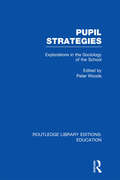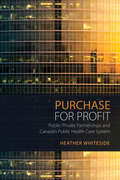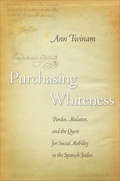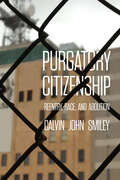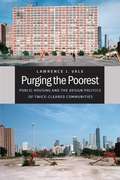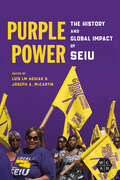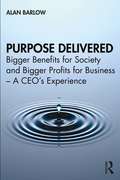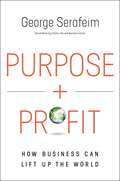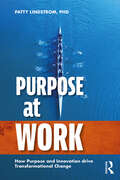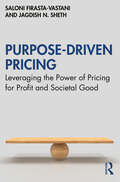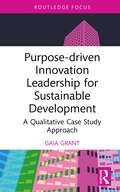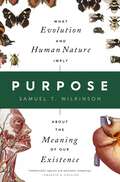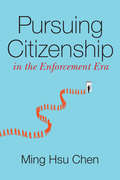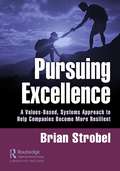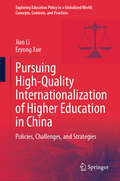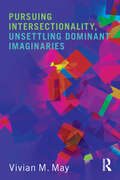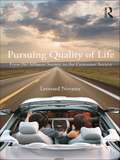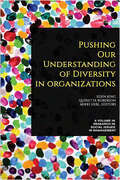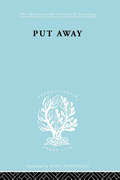- Table View
- List View
Pupil Management and Emerging Democratic Voices: Governing by Knowledge in Schools (Routledge International Studies in the Philosophy of Education)
by Andrew ThomasThis book addresses the distance between contemporary philosophical critiques of education and the classroom context by applying new insights from social philosophy, neurology and historical analysis to common school practices.Critiquing contemporary academic and political debates concerning the use, and misuse, of assessment tools, psychometric testing and classroom management on pupils, this book looks in detail at the consequences of such practices for pupil management and the nurturing of their emerging democratic voices and sense of independence. This book explores these practices in the context of broader social phenomena such as the state of exception, management for legibility, self‑regulation, governmentality and epidemiology. Chapters link critical and philosophical considerations about politics, administration and the brain to real‑world classroom realities and everyday educational activities, forming an important contribution to the wider discourse on learning and inclusion in contemporary school systems.Bringing philosophical and historical insights to bear on the concrete practices of educational life, this book will be of interest to scholars, researchers and postgraduate students in the field of philosophy of education as well as schooling, classroom practice, and pedagogy and didactics more broadly.
Pupil Strategies: Explorations in the Sociology of the School (Routledge Library Editions: Education)
by Peter WoodsWhat do pupils actually do in school? There are remarkably few studies that take the pupils’ perspective and reconstruct experience from their point of view within the context of their own cultures and careers. This volume brings together a number of research studies on various aspects of how pupils cope with schools. The theoretical papers consider amongst other issues a developmental model of the growth of pupil strategies based on primary and secondary socialisation; a discussion of ‘interactionist empiricism’ which argues for co-ordinated research between micro and macro perspectives and an extended overview of the general sociological background of work on teacher and pupil strategies. The empirical articles consider a number of themes ranging from strategies employed in answering teacher questions to the power and influence of the pupil peer group in the development of attitudes and behaviour.
Purchase for Profit
by Heather WhitesideSince the start of the twenty-first century, Canadian provinces have increasingly begun turning to the private sector to finance and construct large-scale infrastructure projects. From a critical public policy perspective, the danger of these public-private partnerships (P3s) is that they are more than just new ways to deliver public infrastructure. They are neoliberal projects that privatize and corporatize the basis of public services.Analyzing four Canadian P3 hospital projects, Heather Whiteside argues that P3s not only fail to fulfill the promises made by their proponents but also compromise public control of health policy, outcomes, and future plans. Yet, despite these disadvantages, the use of P3s is being normalized and expanded in BC and Ontario through capital planning frameworks and special government agencies that support and encourage P3 projects. Based on extensive interviews with academic experts, union representatives, provincial government decision-makers, and private sector partners, Purchase for Profit will be important for those studying public policy in any of the areas in which P3s are now being adopted.
Purchasing Whiteness: Pardos, Mulattos, and the Quest for Social Mobility in the Spanish Indies
by Ann TwinamThe colonization of Spanish America resulted in the mixing of Natives, Europeans, and Africans and the subsequent creation of a casta system that discriminated against them. Members of mixed races could, however, free themselves from such burdensome restrictions through the purchase of a gracias al sacar—a royal exemption that provided the privileges of Whiteness. For more than a century, the whitening gracias al sacar has fascinated historians. Even while the documents remained elusive, scholars continually mentioned the potential to acquire Whiteness as a provocative marker of the historic differences between Anglo and Latin American treatments of race. Purchasing Whiteness explores the fascinating details of 40 cases of whitening petitions, tracking thousands of pages of ensuing conversations as petitioners, royal officials, and local elites disputed not only whether the state should grant full whiteness to deserving individuals, but whether selective prejudices against the castas should cease. Purchasing Whiteness contextualizes the history of the gracias al sacar within the broader framework of three centuries of mixed race efforts to end discrimination. It identifies those historic variables that structured the potential for mobility as Africans moved from slavery to freedom, mixed with Natives and Whites, and transformed later generations into vassals worthy of royal favor. By examining this history of pardo and mulatto mobility, the author provides striking insight into those uniquely characteristic and deeply embedded pathways through which the Hispanic world negotiated processes of inclusion and exclusion.
Pure Fatherhood and the Hollywood Family Film (Palgrave Macmillan Studies in Family and Intimate Life)
by Denise McNulty NortonThis book maps father failure and redemption through three decades of Hollywood family films, revealing how libertarian notions that align agency with autonomy lead to new conflicts for the contemporary father. The films find resolution to these conflicts through a re-gendering of parenting as relationship. In their creation of a ‘pure’ fatherhood that is valorised as authentic for its lack of parental responsibilities, the films serve to challenge the perception that fathering enacted outside the nuclear family structure is fragile. McNulty Norton finds in the films a new essentialism that secures the pure relationship to the biological father, reinforcing his position in the face of changing family forms.
Purgatory Citizenship: Reentry, Race, and Abolition
by Calvin John SmileyReentry after release from incarceration is often presented as a story of redemption. Unfortunately, this is not the reality. Those being released must navigate the reentry process with diminished legal rights and amplified social stigmas, in a journey that is often confusing, complex, and precarious. Making use of life-history interviews, focus groups, and ethnographic fieldwork with low-income urban residents of color, primarily Black men, Calvin John Smiley finds that reentry requires the recently released to negotiate a web of disjointed and often contradictory systems that serve as an extension of the carceral system. No longer behind bars but not fully free, the recently released navigate a state of limbo that deprives them of opportunity and support while leaving them locked in a cycle of perpetual punishment. Warning of the dangers of reformist efforts that only serve to further entrench carceral systems, Purgatory Citizenship advocates for abolitionist solutions rooted in the visions of the people most affected.
Purging the Poorest: Public Housing and the Design Politics of Twice-Cleared Communities
by Lawrence J. ValeThe building and management of public housing is often seen as a signal failure of American public policy, but this is a vastly oversimplified view. In Purging the Poorest, Lawrence J. Vale offers a new narrative of the seventy-five-year struggle to house the "deserving poor. " In the 1930s, two iconic American cities, Atlanta and Chicago, demolished their slums and established some of this country's first public housing. Six decades later, these same cities also led the way in clearing public housing itself. Vale's groundbreaking history of these "twice-cleared" communities provides unprecedented detail about the development, decline, and redevelopment of two of America's most famous housing projects: Chicago's Cabrini-Green and Atlanta's Techwood /Clark Howell Homes. Vale offers the novel concept of design politics to show how issues of architecture and urbanism are intimately bound up in thinking about policy. Drawing from extensive archival research and in-depth interviews, Vale recalibrates the larger cultural role of public housing, revalues the contributions of public housing residents, and reconsiders the role of design and designers.
Purging the Poorest: Public Housing and the Design Politics of Twice-Cleared Communities (Historical Studies Of Urban America Ser.)
by Lawrence J. ValeThe building and management of public housing is often seen as a signal failure of American public policy, but this is a vastly oversimplified view. In Purging the Poorest, Lawrence J. Vale offers a new narrative of the seventy-five-year struggle to house the “deserving poor.”In the 1930s, two iconic American cities, Atlanta and Chicago, demolished their slums and established some of this country’s first public housing. Six decades later, these same cities also led the way in clearing public housing itself. Vale’s groundbreaking history of these “twice-cleared” communities provides unprecedented detail about the development, decline, and redevelopment of two of America’s most famous housing projects: Chicago’s Cabrini-Green and Atlanta’s Techwood /Clark Howell Homes. Vale offers the novel concept of design politics to show how issues of architecture and urbanism are intimately bound up in thinking about policy. Drawing from extensive archival research and in-depth interviews, Vale recalibrates the larger cultural role of public housing, revalues the contributions of public housing residents, and reconsiders the role of design and designers.
Puritan Islam: The Geoexpansion of the Muslim World
by Barry A. VannIn this unique analysis of Muslim population shifts in the Western world, geographer Barry A. Vann provides fresh insights into the theological factors that play into these demographic trends. Vann examines the "imagined geographies" of Muslims with a puritan orientation. People with this mind-set are little inclined to accept a pluralistic, multicultural, live-and-let-live concept of society. And conflicts between conflicting value systems are almost inevitable. Vann notes that this purist approach to Islam is certainly not universal among Muslims, and there are many varying interpretations that are more moderate in outlook. Nonetheless, the undeniable theological background of all Muslim communities colors their values and attitudes, and must be taken into consideration when attempting to understand the potential conflicts between contiguous Muslim and non-Muslim groups. Given the fact that the population of Muslim immigrants is growing in traditionally Christian and increasingly secular countries of the Western world while the resident populations are either stagnant or declining, Vann's insightful analysis of the ways in which Islam influences perceptions of community and geography is of great relevance.
Puritan, Paranoid, Remissive: A Sociology of Modern Culture (Routledge Revivals)
by John CarrollFirst published in 1977, Puritan, Paranoid, Remissive investigates the process of the transformation of Western society in the twentieth century. The author questions assumptions of sociological fashion and goes beyond the descriptions of changes in the economy, government, education, the family, work, leisure and the arts, to a deeper level of historical cause. He proposes three-character types, or patterns of psychological disposition, to indicate respectively the ‘Puritan’ past that is waning, the immediate ‘paranoid’ past that has exemplified society’s crisis of transition, and the ‘remissive’ future, whose ideology already permeates the present. These types reflect his leading theme – the historical decline of the authority of the individual. John Carroll believes that culture has moved faster than character. Focusing on what is conventionally the upper middle class – the bourgeoisie – he proposes the emergence of a new ‘remissive’ culture from the ruins of the old Puritan order, and concludes that the pathology, the remiss nervousness of contemporary Westerners, results from their futile attempts to adapt their enduring Puritan disposition to their hedonist ideals. The twenty-first century carries remnants of this transformation and will be of interest to students of sociology, philosophy, history and political science.
Purple Power: The History and Global Impact of SEIU (Working Class in American History)
by Janice Fine Maite Tapia Joseph A. McCartin Luís Lm Aguiar Adrienne E Eaton Euan Gibb Laurence Hamel-Roy Tashlin Lakhani Yanick Noiseux Benjamin L Peterson Allison Porter Alyssa May Kuchinski Veronica Terriquez Kyoung-Hee YuChartered in 1921, the Service Employees International Union (SEIU) is a worldwide organization that represents more than two million workers in occupations from healthcare and government service to custodians and taxi drivers. Women form more than half the membership while people in minority groups make up approximately forty percent. Luís LM Aguiar and Joseph A. McCartin edit essays on one of contemporary labor’s bedrock organizations. The contributors explore key episodes, themes, and features in the union’s recent history and evaluate SEIU as a union with global aspirations and impact. The first section traces the SEIU’s growth in the last and current centuries. The second section offers in-depth studies of key campaigns in the United States, including the Justice for Janitors and Fight for $15 movements. The third section focuses on the SEIU’s work representing low-wage workers in Canada, Australia, Europe, and Brazil. An interview with Justice for Janitors architect Stephen Lerner rounds out the volume. Contributors: Luís LM Aguiar, Adrienne E. Eaton, Janice Fine, Euan Gibb, Laurence Hamel-Roy, Tashlin Lakhani, Joseph A. McCartin, Yanick Noiseux, Benjamin L. Peterson, Allison Porter, Alyssa May Kuchinski, Maite Tapia, Veronica Terriquez, and Kyoung-Hee Yu
Purpose Delivered: Bigger Benefits for Society and Bigger Profits for Business – A CEO’s Experience
by Alan BarlowGoing beyond the why and what of purpose-led business, this book sets out an innovative business model of how to lead and operate a company to deliver its purpose. Western capitalism is in crisis due to the growing disconnect between business and society, and there are growing calls for a shift from the primacy of shareholder value to the primacy of purpose. But there is a paucity of codified best practice for how CEOs should go about making this shift. Enter Alan Barlow: a CEO practitioner who demonstrates with analytical rigor and evidence-based argument a business model for how CEOs can actually deliver a purpose-defined company that yields both bigger benefits for society and bigger profits for the business. Current and aspiring business leaders and executives will benefit from not only this new business model but also a fully documented route map for monitoring and reviewing successful impact, and highly focused non-financial and financial metrics for benchmarking. Completing the loop for ‘company purpose’ means that business can become a force for good for society.
Purpose and Profit: How Business Can Lift Up the World
by George SerafeimAre purpose and profit in conflict, or can both be achieved simultaneously with the right mindset and tools? What are the forces that are reshaping the relationship between the two? What can we all do to strengthen the relationship between purpose and profit as entrepreneurs, managers, employees, consumers, and investors? Backed by cutting-edge research, Purpose and Profit provides answers to these fundamental questions that are increasingly defining the business landscape all around the world. Distinguished Harvard Business School Professor George Serafeim takes readers on a research-driven journey to understand:How and why environmental and social issues are becoming increasingly relevant for organizations worldwide;The ways that companies can design and implement strategies that generate greater impact;The six archetypes of value creation enabled by these new trends;The role of investors in driving greater recognition of ESG issues; andHow we can all look at the choices we make and careers we pursue in a way that maximizes purpose and profit in our own lives.
Purpose at Work: How Purpose and Innovation Drive Transformational Change
by Patty LindstromThis book offers practical frameworks, models, and case studies that will help leaders inspire and lead change effectively, making it an essential resource. It belongs on the desks of founders, entrepreneurs, CEOs, leadership teams, HR professionals, managers, and consultants across industries, as well as business students.Despite the recognition that innovation is key to growth, many companies struggle to implement it effectively. In this groundbreaking work, Patty Lindstrom introduces a three-dimensional framework for growing an organization’s capacity to innovate, focusing on defining, communicating, activating, and embedding purpose. Purpose is not just a concept—it's the catalyst for scalable growth and lasting change.Drawing on 30 years of real-world experience and insights from a comprehensive study, Lindstrom explores how purpose impacts individuals, teams, and organizations, driving clarity, confidence, and commitment. She reveals how purpose can enhance innovation capacity, transform organizational culture, and lead to tangible, positive change.
Purpose-Driven Pricing: Leveraging the Power of Pricing for Profit and Societal Good
by Jagdish N. Sheth Saloni Firasta-VastaniPricing is frequently used as a key strategic lever for management to increase profitability. However, price can also be used as a lever for societal good. This book demonstrates how effective use of price can have positive societal impacts, such as helping to reduce carbon emissions, accelerating the adoption of eco-friendly products, and improving people’s health outcomes and quality of life.This book, written by two leading thinkers on pricing strategy and practice, makes the important link between the ideals of purpose in organizations and the crucial tools of how to implement change using one of the fundamental levers at the disposal of the organization. It introduces the concept of leveraging the power of pricing for both profit and societal good and then clearly explains how it can be done. Price can be used to manage demand, incentivize consumer behavior, and influence change. The impact can be effective and quick, and it is not far-fetched to say that pro-social pricing can be utilized to preserve the environment, educate citizens, promote arts, alleviate poverty, and improve health. The book outlines how corporations, governments, civil society organizations, and collaborators can use pricing power to manage the adoption of products and services across B2B and B2C. Pricing strategies include innovating, unbundling, unpackaging, collaborating, implementing new monetization models, and applying learnings from behavioral pricing.Executives of corporate and business strategy and those dealing with brand portfolios, sustainability, social and health equity will find profound insights in this book. It will also be valuable in executive training and for graduate students.
Purpose-driven Innovation Leadership for Sustainable Development: A Qualitative Case Study Approach (ISSN)
by Gaia GrantPurpose-driven Innovation Leadership for Sustainable Development presents invaluable insights into how leaders can balance competing innovation demands. The book reports on research from an in-depth case study, which reveals the importance of developing highly adaptative and innovative responses through periods of rapid growth – while simultaneously ensuring organisational stability grounded in a clear core purpose. ‘Paradox’ theory is introduced as a constructive theoretical lens for exploring these complexities of leadership sensemaking in innovation contexts. The findings demonstrate how to incorporate both perspectives to establish a robust innovation culture.This book aims to equip readers with evidence-based principles that can be readily applied in practice. The qualitative methodology, which includes case studies and interviews conducted with global innovation leaders, uncovers powerful strategies from relevant real-world experiences. Targeted ‘Reflection and Action’ questions are also included to guide implementation.Purpose-driven Innovation Leadership for Sustainable Development will support researchers, educators, and students in the higher education sector who would like to investigate contemporary innovation leadership principles and practices. The book will also interest business leaders hoping to access rigorous research studies on the topic presented in an effective actionable format.
Purpose: What Evolution and Human Nature Imply about the Meaning of Our Existence
by Samuel T. WilkinsonBy using principles from a variety of scientific disciplines, Yale Professor Samuel Wilkinson provides a framework for human evolution that reveals an overarching purpose to our existence. Generations have been taught that evolution implies there is no overarching purpose to our existence, that life has no fundamental meaning. We are merely the accumulation of tens of thousands of intricate molecular accidents. Some scientists take this logic one step further, suggesting that evolution is intrinsically atheistic and goes against the concept of God. But is this true? By integrating emerging principles from a variety of scientific disciplines—ranging from evolutionary biology to psychology—Yale Professor Samuel Wilkinson provides a framework of evolution that implies not only that there is an overarching purpose to our existence, but what this purpose is. With respect to our evolution, nature seems to have endowed us with competing dispositions, what Wilkinson calls the dual potential of human nature. We are pulled in different directions: selfishness and altruism, aggression and cooperation, lust and love. When we couple this with the observation that we possess a measure of free will, all this strongly implies there is a universal purpose to our existence. This purpose, at least one of them, is to choose between the good and evil impulses that nature has created within us. Our life is a test. This is a truth, as old as history it seems, that has been espoused by so many of the world&’s religions. From a certain framework, these aspects of human nature—including how evolution shaped us—are evidence for the existence of a God, not against it. Closely related to this is meaning. What is the meaning of life? Based on the scientific data, it would seem that one such meaning is to develop deep and abiding relationships. At least that is what most people report are the most meaningful aspects of their lives. This is a function of our evolution. It is how we were created.
Purrieties of Language: How We Talk about Cats Online
by Edith PodhovnikAfter conquering the Internet, cats are now taking on linguistics! Since the advent of social media, cats have become a topic central to online communication, and the multitude of cat-related accounts now online has made this a world-wide phenomenon. Through cat-inspired varieties of language, we have developed a genre of cat-inspired vocabulary. And on our special social media accounts for our cats, we take on their identities, as we post, write, talk, and chat - as our feline friends. This innovative book provides linguistic analyses of the cyber 'Cativerse', exploring online language variation, and explaining key linguistic concepts – all through the lens of cat-related communication. Each chapter explores a different sociolinguistic phenomena, drawing on fun and engaging examples including memes, hashtags, captions and 'LOLcats', from platforms such as Instagram, Facebook, YouTube and Twitter. Innovative yet accessible, it is catnip for all 'hoomans' interested in how language is used online.
Pursuing Citizenship in the Enforcement Era
by Ming Hsu ChenPursuing Citizenship in the Enforcement Era provides readers with the everyday perspectives of immigrants on what it is like to try to integrate into American society during a time when immigration policy is focused on enforcement and exclusion. The law says that everyone who is not a citizen is an alien. But the social reality is more complicated. Ming Hsu Chen argues that the citizen/alien binary should instead be reframed as a spectrum of citizenship, a concept that emphasizes continuities between the otherwise distinct experiences of membership and belonging for immigrants seeking to become citizens. To understand citizenship from the perspective of noncitizens, this book utilizes interviews with more than one-hundred immigrants of varying legal statuses about their attempts to integrate economically, socially, politically, and legally during a modern era of intense immigration enforcement. Studying the experiences of green card holders, refugees, military service members, temporary workers, international students, and undocumented immigrants uncovers the common plight that underlies their distinctions: limited legal status breeds a sense of citizenship insecurity for all immigrants that inhibits their full integration into society. Bringing together theories of citizenship with empirical data on integration and analysis of contemporary policy, Chen builds a case that formal citizenship status matters more than ever during times of enforcement and argues for constructing pathways to citizenship that enhance both formal and substantive equality of immigrants.
Pursuing Excellence: A Values-Based, Systems Approach to Help Companies Become More Resilient
by Brian StrobelOur companies must start to do things differently. "While many of the ‘20 Bad Habits’ are likely present in companies trying to move up from average, surely habit No 13, ‘Clinging to the Past,’ is one of the larger detractors keeping many of them from moving closer to excellence." — Marshall Goldsmith #1 Leadership Thinker and best-selling author of What Got You Here Won’t Get You There This book is for the people who lead our companies. Our world suffered a staggering blow. We will recover. Many of our companies are still suffering. Some of them will not recover. We’re in a time of disruption. A company’s culture will play a big part in managing through this disruption. Senior leaders must establish a clear purpose, a strong set of core values, and a plan to translate strategy into action. Companies will be seeking to transform, to become more efficient and resilient. Most attempts to do so fail. They fail because we try to solve the wrong problem with the wrong system. We attempt to change the way people act. But to achieve sustained improvement, we must focus on changing the way they think. Over the last thirty years, we’ve experimented with Lean, Six Sigma, and other improvement initiatives. Each failed to move beyond average performance and sustain transformational improvement. Average then became a learned behavior. To move forward, we must unlearn some things. We must change our problem definition and our defined systems. And we can do this by framing the problem through the lens of Operational Excellence.
Pursuing High-Quality Internationalization of Higher Education in China: Policies, Challenges, and Strategies (Exploring Education Policy in a Globalized World: Concepts, Contexts, and Practices)
by Jian Li Eryong XueThis book comprehensively explores the internationalization of higher education in China from the aspects of both challenges and strategies. It analyzes the current educational policies of internationalization in China's higher education, such as the educational policies in running international schools, the educational policies of intercollegiate international exchange, the educational policies of Chinese-Foreign cooperatively run schools, and the educational policies of foreign teachers' professional development. Additionally, this book proposes specific suggestions to address the various problems of internationalization in China’s higher education.
Pursuing Intersectionality, Unsettling Dominant Imaginaries
by Vivian M. MayPursuing Intersectionality, Unsettling Dominant Imaginaries offers a sustained, interdisciplinary exploration of intersectional ideas, histories, and practices that no other text does. Deftly synthesizing much of the existing literatures on intersectionality, one of the most significant theoretical and political precepts of our time, May invites us to confront a disconcerting problem: though intersectionality is widely known, acclaimed, and applied, it is often construed in ways that depoliticize, undercut, or even violate its most basic premises. May cogently demonstrates how intersectionality has been repeatedly resisted, misunderstood, and misapplied: provocatively, she shows the degree to which intersectionality is often undone or undermined by supporters and critics alike. A clarion call to engage intersectionality’s radical ideas, histories, and justice orientations more meaningfully, Pursuing Intersectionality answers the basic questions surrounding intersectionality, attends to its historical roots in Black feminist theory and politics, and offers insights and strategies from across the disciplines for bracketing dominant logics and for orienting toward intersectional dispositions and practices.
Pursuing Quality of Life: From the Affluent Society to the Consumer Society
by Leonard NevarezFrom anxieties over work-life balance and entangling technologies, to celebrations of cool jobs and great places to live, quality of life frames the ways we enhance our lives and legitimate social change today. But how does the idea of quality of life envision the greater good, and what gets lost as a result? This book provides the critical framework for understanding the idea’s contexts and tensions that are conspicuously missing in popular discussions, professional activities, and scholarly research on quality of life. With multiple case studies taken across North America and Europe, it provides a sociological perspective on the contradictory ways we talk about and pursue quality of life in relation to technology, consumerism, family, work, public space, rural ways of life, and ultimately the final years of life. Drawing on contemporary and classical social theory, it provides an incisive account of the historical shifts in developed societies over the last half-century that have transformed our views and pursuits of quality of life. Originally a promise to undertake collective effort and pursue social justice at a moment of unprecedented opportunity, quality of life now enshrines a solipsistic ideal with which to accommodate the storms of market forces and political failure.
Pushing Our Understanding Of Diversity In Organizations: A Volume in Research in Social Issues in Management
by Michelle R. Hebl Eden King Quinetta M. RobersonFew time periods in the past five decades match the intensity of intergroup conflict that people around the world are currently experiencing. Polarized attitudes around various sociopolitical issues, such as gender equality and immigration, have dominated the media and our lives. Furthermore, these powerful social dynamics have also impacted the places where we work and intensified existing strains on workers and workplaces. To address these issues and improve organizational climates, more theories, research and collaborations to understand these phenomena are needed. The volumes in this series will describe and instigate scholarship that advances our understanding of diversity in organizations. <P><P> This volume features renowned scholars who are unabashedly pushing the field by raising the questions that need to be asked, by working on topics that have received far too little research attention, and by holding researchers, practitioners, managers, organizations, and readers to task for doing what needs to be done to maximize social justice and egalitarian behaviors in the workplace. The chapters provoke the status quo in society and in scholarship, and in so doing, push our understanding of diversity in organizations.
Put Away Ils 265: Institutions For The Mentally Retarded (International Library of Sociology)
by Pauline MorrisThis is Volume VI in a series of seven on the Sociology of Mental Health. Originally published in 1969, and using language of the time, this is a sociological study of institutions and hospitals for those with mental health conditions.

